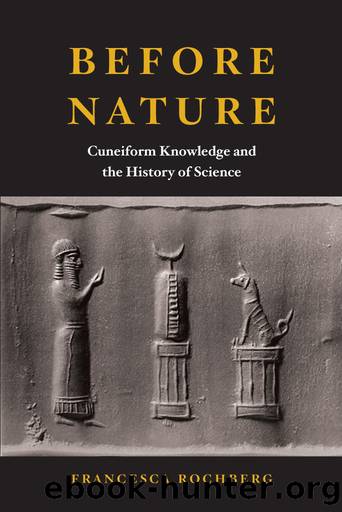Before Nature by Francesca Rochberg;

Author:Francesca Rochberg; [Rochberg, Francesca]
Language: eng
Format: epub
ISBN: 9780226406275
Publisher: University of Chicago Press
Published: 2016-12-14T06:00:00+00:00
These remarks on medieval science are not mentioned in order to explain cuneiform omens in terms of the epistemic practices of medieval Scholasticism, but simply to note that the history of science has accommodated a wide range of speculative imagination stemming from the contemporary or local background of ideas about the phenomena. In the cuneiform world, the choice of what to observe of celestial phenomena was guided by perception and by the potential for constructing meaning through correspondences between phenomena in the sky (and on earth) and those in the world of political and economic events. Constructions of meaning were given form in the lists of conditional omen statements, the âifs.â16
Not only were imagined celestial phenomena a feature of the omen series, the consequents of ominous phenomena were equally constructed. Illustrative of the constructed, as opposed to the observational, nature of omen statements are the lunar eclipse omens of EnÅ«ma Anu Enlil Tablets 20 and 21, in which lunar eclipses of a given description are paired with events set in various city-states well known from early Mesopotamian history. In naming the city-states of Eridu, Agade, Ur, Subartu, Gutium, EÅ¡nunna, Emutbal, Babylon, Amurru, as well as the enemy known as the âUmmanmanda,â for example, the events of the apodoses of Tablet 20 point to second and even third millennium dynasties, such as the Early Dynastic, Ur III, and Old Babylonian. Tablet 21 makes reference to areas of political significance to the eastern borders during the Old Babylonian period, such as DÄr, Elam, and AnÅ¡an.17
The Neo-Assyrian period ummânÅ« who copied and used these texts were well educated in the dynastic past, although the exemplary meaning of that past for them, and how it was deployed for the interpretation of phenomena, renders these passages difficult for us to deal with from a modern historical perspective, certainly as the basis for dating these texts. Tablet 20 §III, for example, describes an eclipse occurring on the fourteenth day of SimÄnu (Month III), beginning on the east above and clearing on the west below, and lasting from the first night watch until the middle watch. Following the description of the eclipse, the text gives the âprediction,â that is, the consequent (âQâ), thus: âThe prediction (literally, âdecisionâ) is given for Ur. The king of Ur will experience famine. There will be much pestilence. The king of Ur, his son will wrong him, and the son who wronged his father, Shamash will catch him. He will die in the mourning place of his father. The son of the king who was not named for kingship will seize the throne.â18 An eclipse for the fourteenth day of Abu (Month V), beginning on the west above and clearing on the north below during the middle watch, is associated with the following events in EÅ¡nunna: âThe servant, beloved of his lord, will kill his lord. The land will become fearful. The son of the king, because of the murder, will flee from his beloved city and avenge his father. He will cut off the hand of the servant, the murderer of his father.
Download
This site does not store any files on its server. We only index and link to content provided by other sites. Please contact the content providers to delete copyright contents if any and email us, we'll remove relevant links or contents immediately.
De Catalaanse brief by Robert Goddard(263)
A Piece of Cake by Sarah Swatridge(207)
Nonlinear Dynamics and Chaos with Student Solutions Manual by Steven H. Strogatz(187)
The Ruin of J. Robert Oppenheimer by Priscilla J. McMillan(171)
Churchill's Spearhead by John Greenacre(162)
Flowering of the Cumberland by Harriette Simpson Arnow(148)
thing bounces back europe by Unknown(145)
Popular Culture and Political Identity in the Arab Gulf States by Alanoud Alsharekh Robert Springborg(139)
A Japanese View of Nature by Kinji Imanishi Pamela J. Asquith(128)
Allied Bombing Raids by Philip Kaplan(125)
Comet Madness by Richard J. Goodrich(124)
Guild and State by Antony Black(122)
A History of Science in Society by Ede Andrew;Cormack Lesley B.;(113)
RAF at the Crossroads by Greg Baughen(112)
History Without A Subject by David Ashley(110)
The Seventies Now: Culture As Surveillance by Stephen Paul Miller(107)
Air Battle for Burma by Evans Bryn;(105)
A History of Greek and Roman Philosophy by John Hackney(104)
Shocking Bodies by Iwan Rhys Morus(103)
